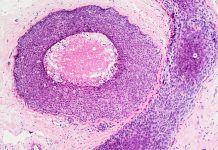Dr Deborah Lee, Dr Fox Online Pharmacy, tells us all about the European pancreatic cancer early detection trial (EUROPAC)
Pancreatic cancer is a deadly disease. It killed my grandmother in her 60’s, and my father in his 80’s. Is this just a coincidence I have two, first degree relatives who died from cancer of the pancreas, or could it mean the family carries an abnormal gene? Do you know what I’m thinking?
So, when I heard about the European pancreatic cancer early detection trial (EUROPAC) I was delighted. Let me tell you more.
What is pancreatic cancer? Your pancreas is a sponge-like organ that sits across the upper part of the abdominal area, and against the back wall of the abdomen (tummy). Because it is so deep in the body cavity, if cancer develops in the pancreas, the tumour has often grown very large by the time it is diagnosed.
The problem of late diagnosis
Only 1 in 5 people are diagnosed with cancer of the pancreas at an early enough stage, when treatment has the best chance of success. Only 1 in every 10 people with pancreatic cancer will receive potentially curative surgery, and only 2 in 10 will receive chemotherapy. Very sadly, 7 in 10 will not be able to receive any active treatment. Around one half of pancreatic cancer diagnoses are made as an emergency when the one-year survival is under 12%.
What are the symptoms?
This is the problem – pancreatic cancer often only causes mild symptoms in the early stages, which may easily be passed of as being due to many other common conditions. However, important symptoms include –
- Epigastric (upper abdominal) pain or backache, which typically gets worse when you eat, may come and go and is said to feel better on leaning forwards.
- Unexplained weight loss
- Yellow jaundice may develop, with yellowing of the skin and the whites of the eyes.
There may be other symptoms such as –
- Nausea and vomiting
- Diarrhoea or constipation
- Fever or shivering
- Acid indigestion
- Deep vein thrombosis (blood clots)
Sometimes people with pancreatic cancer develop diabetes because their pancreas isn’t working as it should.
Causes of cancer of the pancreas
The cause of pancreatic cancer is not known. However, the number of cases of pancreatic cancer have risen by around 1% per year over the past 40 years.
However, there are certain non-modifiable risk factors.
Non-modifiable risk factors
- Age – It is more common in people aged over 50.
- Sex– It occurs in both sexes but is more common in males.
- Ethnicity – It is more common in African Americans.
- Blood group – It is more common in those with blood group A.
- Family history – One meta-analysis of nine studies reported that if you have one first degree relative with pancreatic cancer, this increases your own risk of getting it by 80%. In familial pancreatic cancer, the genes BRCA2 and PALB have been identified.
- Type-1 diabetes – The risk of pancreatic cancer is doubled in people with type-1 diabetes
Modifiable risk factors
Some risk factors are modifiable –
- Smoking – A huge 2008 meta-analysis, containing 82 studies, concluded that current smoking increases the risk of pancreatic cancer by 75%. The risk is also elevated by the number of years of smoking and the number of cigarettes smoked.
- Alcohol – A heavy alcohol intake increases the risk of pancreatic cancer. The risk is highest in men who drink spirits.
- Chronic pancreatitis – This is an inflammatory condition of the pancreas. 5% of those with chronic pancreatitis will develop cancer of the pancreas in their lifetime.
- Obesity – Many studies have linked obesity to an increased risk of pancreatic cancer. There is a 10% increase in risk for each increase of 5 units of BMI.
- Diet – There may a link between excess consumption of red meat and cancer of the pancreas.
- Helicobacter pylori – This is a type of bacteria that can infect the stomach and increase the risk of gastritis and stomach cancer. Interestingly, H.pylori infection may also increase the risk of pancreatic cancer.
How is pancreatic cancer diagnosed?
Most often, if your GP suspects you might have pancreatic cancer, you will have an ultrasound of your abdomen, or a CT or MRI scan. If a cancer is found, further tests are carried out including a biopsy.
Treatments for cancer of the pancreas
Pancreatic cancer can sometimes be treated with surgery, or with radiotherapy or chemotherapy.
Very often, treatment is palliative only, which means it is not curative – it is designed to help improve your quality of life.
The EUROPAC trial – what will happen to me?
To start with, I have to fill in a form with a detailed medical and family history. I send this back with copies of the relevant death certificates.
To register for the trial, I will first be asked for a sample of blood and urine. Once the team have assessed all these details and results, they will decide if am suitable to be accepted. I will not be eligible to take part if my risk of pancreatic cancer is estimated to be less than 2% over the next 3 years. If I am accepted onto the trial, this will then entail 2 appointments a year, with regular ultrasounds, CT and MRI scans, and blood tests.
In my personal view, I feel if there is a team out there who might be able to help me, I would like to be involved. The aim of the trial is to help improve the early detection of pancreatic cancer and it seems to me if I’m going to get it, the faster the cancer is picked up, the better my chances. It is a bit scary, but life is about facing up to things and being proactive. Plus, my involvement might help others, including my children. Wish me luck!
Want to find out more?
If you want to find out more about the EUROPAC trial –
- Visit Cancer Research UK – https://www.cancerresearchuk.org/
- The EUROPAC trial is being run at the University of Liverpool and is recruiting until 15/07/2039. To make contact, either send an email – via the Cancer Research UK website, or Freephone – 0808 8004040











